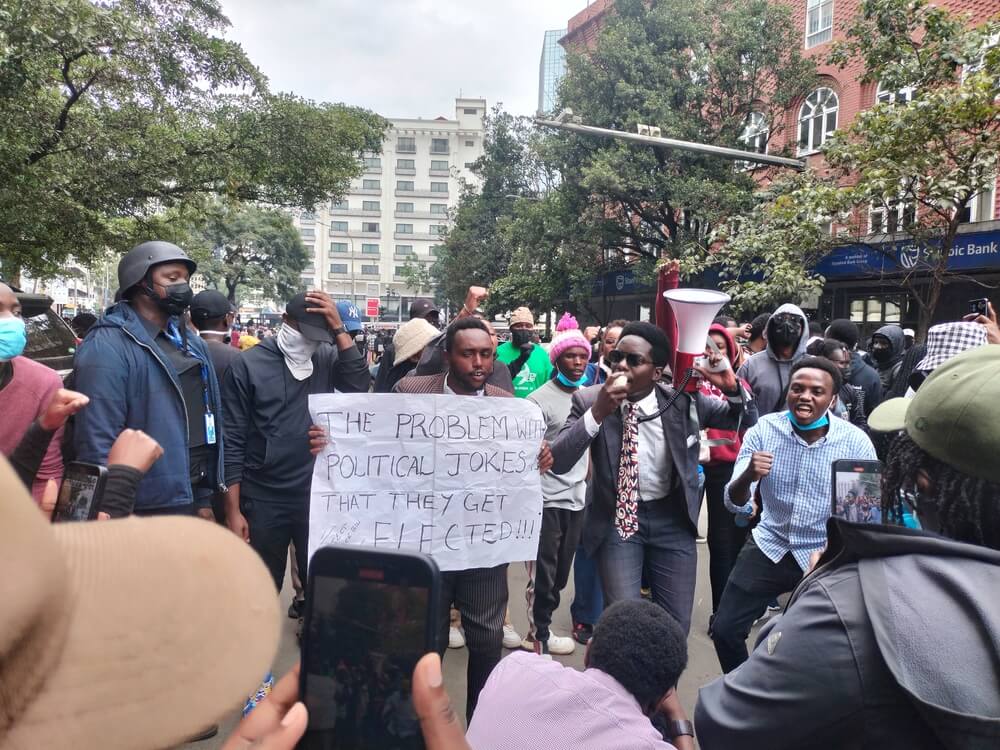The US investment in security in Africa through the recent alliance agreement with Kenya could prove to be in vain if the government in Nairobi does not rapidly find a solution to the enormous economic problems that have triggered massive civil protests.
Up to 27 people have died in waves of demonstrations across Kenya. They were outraged by the government's intention to increase taxes, which would further worsen the population's already difficult situation.
In response to the protests, Kenyan President William Ruto partially relented and announced that he would not sign the controversial tax increase bill, and that a number of products and services would be exempt. He also promised that the military would not intervene in the next protests as long as they were non-violent.
However, President Ruto's withdrawal is primarily due to the rebuke from Washington. US Secretary of State Antony Blinken called on President Ruto to refrain from excessive use of force following news of the brutal intervention by security forces against protesters in Kenya last week.
At the same time, Secretary of State Blinken thanked the Kenyan President "for taking steps to reduce tensions and pledging to engage in dialogue with the protesters and civil society."
In doing so, Blinken drew a roadmap for the Kenyan leader—the kind of relationship Washington expects from its Kenyan partner at a very turbulent time that threatens to drag one of Africa's most stable democracies into a deep security crisis. For now, President Ruto is taking steps in line with the US recommendation.
Privileged US partner
The fact is, however, that the mass protests in several Kenyan cities escalated just a few weeks after the US granted Kenya the status of a Major Non-NATO Ally.
This is the privileged status of defence cooperation with the US that 18 countries have so far, only three of them in Africa (Egypt, Morocco, and Tunisia), and Kenya is the first sub-Saharan country to have such an agreement.
Kenya has earned this privileged status through its long-standing cooperation in the fight against extremists in East Africa, its participation in international counter-terrorism operations, and, more recently, its willingness to send hundreds of its police officers to Haiti. Kenya is also a member of the US-led global coalition that supports Ukraine's defence against Russian aggression.
However, a series of military coups in the Sahel in recent years, which aimed to eliminate the Western military presence, somewhat forced the US to choose Kenya as its first and closest security partner in sub-Saharan Africa.
Preparations by the US and Kenyan armies for major joint exercises (Justified Accord) in Kenya in February next year began in June
At the same time, political and economic instability, as well as the trend towards partnerships with Russia, disqualified South Africa or Nigeria from the circle of potential partners.
The agreement, announced by US President Joe Biden during President Ruto's pompous three-day visit to Washington in mid-May, gives Kenya access to advanced military technology, procurement of weapons from US stockpiles, participation in security technology and development projects, and other benefits that countries outside the circle of NATO and Major Non-NATO allies do not have.
According to the agreement, preparations by the US and Kenyan armies for major joint exercises (Justified Accord) in Kenya in February next year began in June.
A social rebellion develops into a political crisis
However, it may turn out that President Biden's administration's decision regarding Kenya was hasty. The protests that erupted across Kenya in the immediate aftermath of its president's undisputed foreign policy success are an expression of a deep economic and social crisis.
President Ruto faces the possibility of the social rebellion escalating into a political crisis and threatening his presidential mandate, which runs until 2027.
 President William Ruto faces the possibility of the social rebellion escalating into a political crisis and threatening his presidential mandate, which runs until 2027
President William Ruto faces the possibility of the social rebellion escalating into a political crisis and threatening his presidential mandate, which runs until 2027
The fact that he has given in to demonstrators' demands and US warnings will certainly not calm the rebellion. The dissatisfaction has far deeper roots than the controversial tax increase law.
After rapid economic growth in the early 2000s, Kenya fell into a debt crisis with domestic and foreign creditors, which now totals around $80 billion. Although it is relatively manageable at around 70% of GDP, Kenya spends up to 60% of its income on debt repayments, making it increasingly difficult for the economy to bear.
High prices and taxes exacerbate the situation, but there is also widespread corruption, political pressure, and the president's behaviour that prioritises his international affairs over resolving domestic issues.
Poor diplomatic judgement
The security agreement with the US is therefore not particularly significant for millions of Kenyans, who struggle daily with high inflation and poor public services.
At this time, the US diplomatic decision to grant Kenya Major Non-NATO ally status is clearly flawed. It is possible that this is President Biden's desire to bring back a significant foreign policy point from Africa at the end of the election campaign, when the US presence in Africa has been rapidly diminishing in favour of China and Russia.
The US has a duty to assist its most significant security ally in sub-Saharan Africa in escaping economic hardship
After making this decision, the US has a duty to assist its most significant security ally in sub-Saharan Africa in escaping economic hardship, particularly by using its influence with international creditors.
The future of the American presence in large parts of the African continent, which has been on the defensive for years, depends directly on whether Kenya's biggest burden, namely its unsustainable debt, can be reduced.